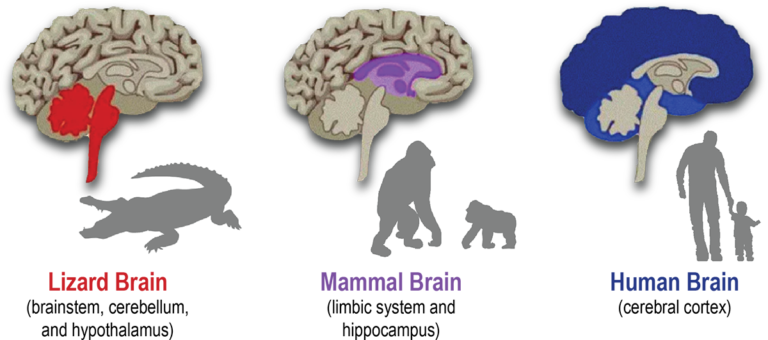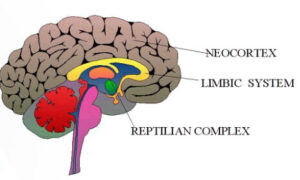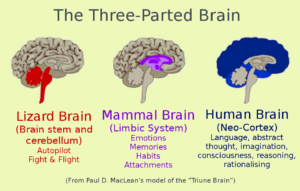
Self Mastery IV: Aligning the Reptilian Brain by Bridging Instinct and Intention
December 10th, 2024 – By Ruben Bijman.
Ever feel like part of you is sabotaging your best-laid plans?
That’s your reptilian brain—a primal toddler with no patience for your ambitions. But it’s not hopeless. Feed it, calm it, and it’ll stop throwing tantrums.
Learn to work with it, and your goals will feel more attainable, with less internal resistance.
Your Survival Brain Is Stuck in the Stone Age
The reptilian brain, our most primal layer, is the seat of instinct. Its primary concerns are survival and the here-and-now. It governs fight-or-flight responses, basic habits, and visceral reactions. It’s unbothered by future plans or lofty goals—it wants safety, nourishment, and a calm environment and it wants it now.
This often leads to conflicts with the more evolved human brain, which can think abstractly, plan for the future, and set long-term goals. A classic example is deciding to exercise. Your human brain envisions a fitter, healthier you and schedules a morning workout.
The reptilian brain, however, doesn’t care about tomorrow—it only reacts when it’s time to actually lace up those sneakers. And if you’re tired, hungry, or stressed? It will scream at you to stay in bed, because survival comes first. We have all been there.
The Reptilian Brain: A Survival Machine
This primal brain is dominant for a reason—it’s been keeping us alive for time immemorial. To align it with our higher aspirations, we must first address its survival needs. Think of it as negotiating with a stubborn, instinct-driven toddler: if it’s well-fed, well-rested, and feels secure, it’s more likely to cooperate.
Neglecting these basics, however, amplifies its resistance. Have you ever tried powering through a tough workout on three hours of sleep? Or attempting a courageous act—like asking someone out—while hungover or starving? It’s nearly impossible because the reptilian brain, sensing vulnerability, demands you conserve energy and avoid risk.
The solution is deceptively simple: take care of your body. Consistent sleep, nutritious meals, hydration, stress management, and avoiding toxins like alcohol or drugs calm the reptilian brain and reduce internal conflict. When the body feels safe and supported, the human brain’s goals become less threatening, and the primal brain starts to follow suit.
The reptilian brain is rarely satisfied, operating in a perpetual state of scarcity, always bracing for the next famine. It craves sugar, alcohol, and nicotine because it instinctively links them to immediate survival benefits, making these temptations particularly difficult to resist—more on this in another post, but if the human brain does not discipline the reptilian brain here, it will eat and abuse itself into an early grave.
The Illusion of Danger: Social Risks in Modern Life
In today’s world, social risks rarely threaten our survival, but our reptilian brain hasn’t caught up. It still reacts to these situations as if exile or rejection could be fatal because back in the caveman days it was.
This creates a frustrating paradox: you know logically that presenting at work or asking someone out won’t kill you, but your body floods with adrenaline and fear anyway.
Common social risks include:
- Presenting in front of a group: Your reptilian brain perceives the eyes from the audience as being vulnerable; one social misstep and your reputation and social standing is ruined
- Getting rejected romantically: While your human brain recognizes it as a learning experience, your primal brain equates rejection with banishment.
- Facing criticism or disapproval: Whether it’s a harsh comment online or a disagreement with a colleague, the reptilian brain reacts as if you’re being ousted from the tribe.
The truth is, these risks aren’t dangerous anymore. A poor presentation, romantic rejection, or even being disliked by someone won’t ruin your life. However, overcoming these fears takes more than logic—it requires signaling safety to your reptilian brain through deliberate, incremental action.
There is no shortcut, only deliberate, incremental action can help you overcome the fear.
Overcoming Social Fears: Teaching the Reptilian Brain It’s Safe
The reptilian brain learns through experience, not reasoning. To ease its social fears, you must show it—step by step—that these situations are safe and even rewarding. Here’s how to create a positive feedback loop that calms your primal instincts and strengthens your confidence.
1. Start Small and Build Momentum
Break down social risks into manageable steps. If public speaking terrifies you, don’t dive straight into addressing a large audience. Start with a smaller challenge: share a brief thought in a casual group setting or practice speaking in front of close friends. Each small success signals to your reptilian brain that it’s safe.
Momentum is key here. Each step forward, no matter how small, builds a foundation of trust between your reptilian brain and the rest of you, making larger challenges feel less intimidating over time.
2. Focus on Positive Reinforcement
Pair every action with a reward. If you successfully ask someone out or voice your opinion in a group, take a moment to feel proud. If the result isn’t what you hoped for, focus on the courage it took to try and reward yourself for the effort.
Mental rewards are especially powerful—be kind to yourself in how you evaluate your attempts. Celebrate the bravery it takes to act, regardless of the outcome. This trains your brain to associate risks with growth rather than danger.
3. Desensitize Through Repetition and Routine
Repetition diminishes fear. The first time you face a challenge like presenting to a group, your reptilian brain may panic. By the fifth or tenth time, familiarity will ease the fear.
Create routines where these challenges become regular parts of your life. For example, if meeting new people is intimidating, set a weekly goal to introduce yourself to someone new. Repetition transforms novel risks into ordinary experiences, rewiring your brain’s response to them.
4. Reframe Failure as Growth
Failure is inevitable, but it doesn’t have to be threatening. Train your brain to see mistakes as essential steps toward mastery. Every awkward conversation, rejection, or stumble is proof that you are actively trying—and trying is progress.
This reframing shifts the reptilian brain’s focus away from avoidance and toward curiosity. Instead of fearing failure, your brain begins to anticipate what it might learn from each experience.
5. Visualize with Purpose
Visualization is a powerful tool, but its effectiveness depends on what you focus on. Imagine yourself succeeding—picture the positive outcome and how it feels. Visualization primes your brain for the experience, reducing uncertainty and calming fear.
Be cautious about imagining worst-case scenarios. These mental rehearsals stress out the reptilian brain, reinforcing fear rather than easing it. The human brain’s role is to guide visualization wisely, creating a roadmap for success rather than amplifying anxiety.
Easier said than done, I know. Try anyway.
6. Celebrate Milestones, Big and Small
Celebration reinforces progress. Acknowledge every step forward, no matter how small. Did you speak up in a meeting? Share a vulnerable thought? These are wins, and they deserve recognition.
Celebrating builds positive associations with social risks, encouraging your reptilian brain to welcome them. Over time, this transforms what once felt intimidating into experiences that feel natural and rewarding.
Don’t underestimate small mental celebrations, be nice to yourself.
Survival Instincts in the Modern World: When Logic and Instinct Clash
The reptilian brain’s survival drives can also manifest in behaviors that seem illogical in today’s context.
Fear of the Unknown
The reptilian brain instinctively avoids uncertainty, associating it with danger. This leads to behaviors like:
- Hesitating to try new activities or hobbies, fearing failure or embarrassment.
- Avoiding meeting new people, as the brain clings to familiar social groups.
- Refusing to explore new environments, even when they offer opportunity or enrichment.
- Resisting new ideas, leading to a rigid, close-minded outlook.
Incremental exposure is the key to overcoming this fear. Starting with small, manageable steps—like visiting a new place in your community or experimenting with a simple hobby—signals to the reptilian brain that the unknown is not inherently dangerous. Over time, these actions build curiosity and confidence, opening the door to growth.
Social Comparison
Social comparison is another instinct rooted in survival. Historically, assessing one’s standing in a group helped maintain harmony and ensured access to resources. Today, however, this instinct often misfires, creating unnecessary stress.
- The Illusion of Superiority: In every community, there will be those who appear wealthier, more talented, or more admired. This can trigger feelings of inadequacy, as the reptilian brain misinterprets these differences as threats to survival or status.
- Chasing External Validation: This instinct drives people to seek approval or recognition from others, often at the expense of their true values or goals.
To counter this, focus on intrinsic worth rather than external validation. Recognizing that others’ successes don’t diminish your own value helps calm the reptilian brain (a topic that deserves it’s own post). Additionally, cultivating gratitude for your unique strengths and contributions reinforces a sense of abundance rather than competition.
Only compare yourself with yourself. Have you grown? Are you a better version of yourself? Did you incorporate some new quality habits over the lasts months? Good! What are people achieved is irrelevant.
A Survival Machine Run Amok
Our reptilian brain craves immediate rewards, seeing calorie-rich foods or addictive substances as an instant survival win. This instinct, while crucial in times of scarcity, often backfires in environments of abundance. Substances like drugs, alcohol, and nicotine further exploit this mechanism by altering the brain’s biochemistry, flooding it with dopamine and creating an artificial sense of safety and satisfaction. The reptilian brain, fooled by these signals, craves these substances even more, reinforcing destructive behaviors. If the human brain does not step in to discipline these instincts, the reptilian brain will overindulge, leading the body toward an early grave.
Building a New Relationship with Fear
True self-mastery is not about silencing the reptilian brain but learning to guide it with understanding and care. By addressing its needs and gradually building trust through deliberate action, you can transform what once felt like resistance into a source of strength.
Progress is rarely linear, and setbacks are part of the journey. Yet, with patience and persistence, you’ll find that alignment between instinct and intention becomes more natural over time. Each small step forward is proof that change is possible.
Your primal instincts, when nurtured and understood, can become allies in your growth. They remind you of the importance of self-care and connection, while your higher brain charts the path forward.
In the next post we will adres aligning your mammal brain -your emotions- with your human brain.
Get new blog posts delivered in your mailbox—no spam, just precious wisdom!
You’re almost there!
Check your inbox and confirm your subscription to start receiving the newsletter
Follow me on X (Twitter):
Get new blog posts delivered in your mailbox—no spam, just precious wisdom!
You’re almost there! Check your inbox and confirm your subscription to start receiving the newsletter
Follow me on X (Twitter):
Populair Essays:

Self-Mastery II : How Awareness Tames your Brain’s Feuding Trio
Have you ever wondered why you sometimes feel like there’s a battle raging inside you? One part of you wants to eat the salad, while another screams for pizza. Or you have big dreams, but somehow Netflix wins every time.
These struggles aren’t random—they’re the result of a clash between your three sub-brains: the lizard, the mammal, and the human.
Learn here how Awareness helps you understand yourself and gaining control.

Self-Mastery III : Aligning the Human Brain by Turning Awareness into Action
“What’s the one thing you’ve been avoiding?” This question is the first step toward aligning your human brain to take action. In a world where our lizard and mammal brains often pull us in different directions, recognizing this internal conflict is crucial. But awareness alone isn’t enough; it’s time to take small, consistent actions that challenge and excite you. Discover how prioritizing one goal can lead to incredible progress and build the courage to confront your fears. Ready to transform your life? Your next step awaits—one step at a time.

Self-Mastery I : Pursue Wisdom by Understanding the Inner Chaos of your Brain
Your brain isn’t a single, unified command center. It’s more like a committee of three, constantly bickering over what you should do, think, and feel.
So, let’s dive in and meet your inner lizard, mammal, and human—and uncover how their constant battle shapes your life.
